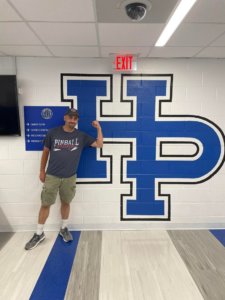
The names get stuck in the collective consciousness: Uvalde, Buffalo, Parkland, Sandy Hook, Virginia Tech, Colombine, and so many more. Until yesterday, I couldn’t imagine what it was like to really know one of those places – to live in, or grow up in, one of those cities. Sure, they all made me sad and angry, but they were places I didn’t really know.
I grew up in Highland Park, Illinois. I attended Highland Park High School and in fact just celebrated a reunion last week. I was surprised at how many of my classmates had left only to find their way back again as adults. It’s a wonderful town in which to live and raise a family.
I attended the Fourth of July parade there a dozen times or more when I was younger. One of my first jobs was at a hot dog restaurant just a block from the shootings.
I’ve called Highland Park home for most of my life.
So this mass shooting – one of hundreds in the United States this year alone – hit me especially hard. I feel shaken, heartbroken, and terrified.
And yet… I don’t know what to do.
For someone who gets paid to speak and write, I find myself at a loss for words.
I don’t know how to express my profound sadness in a meaningful way.
Here’s what I do know:
I do know that I am scared.
I do know that I desperately want to protect my family.
I do know that I am disappointed in what I once thought was the greatest country in the world.
I do know that change is difficult and takes time.
I do know that I want to help make the country and the world a better place.
While religions often turn to holy texts for explanation, interpretation, and comfort in times like these, I find myself turning to what I know best.
One of the critical aspects of customer experience is listening. If you listen to your customers – literally hear their voices – you can learn so much.
You can learn what you’re doing right, so that you can do more of it. You can learn what you’re doing wrong, so you can stop or improve upon it.
You can also learn that others don’t perceive experiences in the same way you do, or in the way you thought they would.
What if we all started listening more?
I don’t mean listening to haughty politicians, biased media outlets, or meddling lobbyists – on either side of the political spectrum.
I mean listening to our neighbors, coworkers, and spiritual leaders; people who look like us and people who don’t; people who live near us and people who don’t; people who believe what we believe and people who don’t.
Just listen.
What I think (and hope) you’ll hear is that objects in the mirror are closer than they appear. We’re likely more similar than we are different. And if we are indeed different, that’s still okay.
We just don’t spend enough time listening to, and learning from, each other.
So let’s listen to gun owners and advocates to better understand their point of view. And let’s listen to people who want to make it harder to acquire a gun to better understand their point of view.
Let’s also listen to mental health professionals to better understand the scope of that crisis and how it contributes to other societal issues. And let’s listen to safety and security experts to learn how to make schools and movie theaters and shopping malls and parades safer for everyone.
A good negotiation starts with the points in common.
No one wants more mass shootings. That’s a starting point we can all agree on.
I think we can also agree that mass shootings are a problem worth solving, and that if the only two answers are everyone gets a gun or no one gets a gun, we’re not going to get very far.
So let’s all listen more, and understand the nuances of people’s views, so that we may find common ground. Let’s try embracing the gray in the middle instead of living at the black and white edges.
Then we can have an intelligent conversation about what to do next, so we can all move forward together.
To help those directly impacted by the mass shooting in Highland Park, the Highland Park Community Foundation has established a July 4th Highland Park Shooting Response Fund. All contributions to the Response Fund will go directly to victims and survivors or the organizations that support them.
